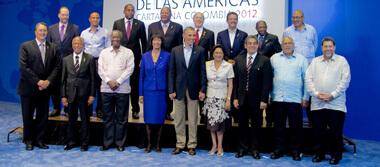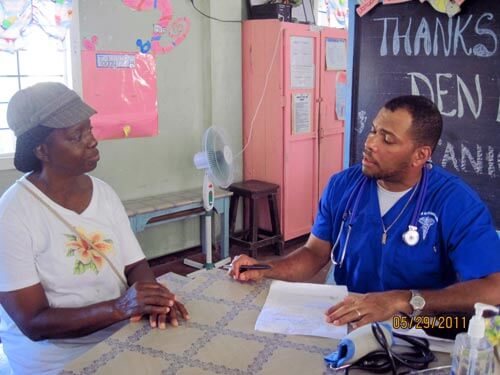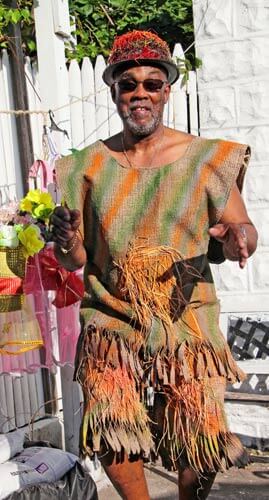Caribbean Community (CARICOM) leaders held a special meeting on the margins of the Sixth Summit of the Americas in Cartagena, Colombia, on Sunday, with President of Mexico Felipe de Jesus Calderón, in which they discussed a wide range of issues, including mechanisms for further bilateral and hemispheric cooperation, and strategies to prevent further financial fallout from the global economic crisis.
One of the key issues discussed was the need to develop a plan of action to address poverty and to avert a further decline of regional economies, according to Antigua and Barbuda Prime Minister Baldwin Spencer.
“There is need for immediate intervention to address the negative effects being experienced as a result of the financial crisis,” said Spencer after the meeting.
“Without direct intervention, there is increased risk of economic decline and concomitantly social disintegration,” he added. “We cannot sit by and allow our people and our economies to suffer.”
Spencer said he and his colleagues also sought the assistance of the Mexican president in raising the concerns of Antigua and Barbuda and the CARICOM sub-region at the G20 meeting.
Some CARICOM member states are characterized as middle income by most of the Group of 20 (G20) of the world’s richer countries and are, therefore, not able to access certain sources of financing.
“CARICOM member states are not members of the G20. We must, therefore, rely on our allies to bring our issues of concern to the wider G20 membership, and the government of Mexico has readily agreed to assist in this regard,” Spencer said.
In a separate meeting, the Antiguan leader held talks on Sunday with U.S. Trade Representative Ron Kirk on Antigua’s Internet Gaming case against the United States.
Spencer said he expressed disappointment that, although the case was first adjudicated in 2003, Antigua and Barbuda and the United States are yet to find a “mutually agreeable solution to settle the case.”
The prime minister noted that Antigua and Barbuda had put forth several options to settle the case but that “there has been no fairness in the proposals received from the United States to date.
“Antigua and Barbuda’s Internet gaming sector has been decimated by the actions of the United States, and we believe that we must be fairly compensated for those losses,” Spencer said.
In an effort to bring a fresh perspective to the case, Spencer said he urged the United States representative to accept Antigua and Barbuda’s recent proposal to take advantage of a “good offices” mediation effort by the World Trade Organization (WTO) director general.
Spencer said Kirk acknowledged that a solution to the case had been elusive but assured him that “the United States remained committed to working with Antigua and Barbuda in finding a solution to the case.”
The Antiguan leader said Kirk “expressed the willingness of his office to review the latest proposal from Antigua and Barbuda and to hold further discussions with Antigua and Barbuda’s ambassador in Washington, D.C. over the next few days so that a strategy for further action could be discussed.”


























